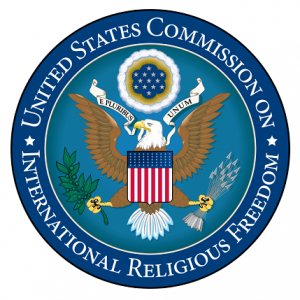Religious Freedom for All? Congress’s Conspicuous Absence of Advocacy for Non-Religious Prisoners of Conscience

AHA Grassroots and Advocacy Intern Apurva Parikh attended a Congressional hearing on the plight of prisoners of conscience, but why weren’t atheists and agnostics mentioned?
On January 16th, co-chairs Frank Wolf and James McGovern of the Tom Lantos Human Rights Commission conducted a public hearing with the representatives of the United States Commission on International Religious Freedom (USCIRF). The focus of the hearing was on the plight of prisoners of conscience (POC) around the world, or in other words, individuals imprisoned or persecuted for the non-violent expression of their race and conscientiously held religious or political views. Featured in the hearing were various testimonies by witnesses around the world, including families and individuals from China, Russia, Bahrain, and Vietnam, directly affected by this issue and the chair of the USCIRF, Dr. Robert P. George.
One of the initiatives highlighted from the start was the Defending Freedoms Project, started by the Lantos Commission and USCIRF in conjunction with Amnesty International. Through the Defending Freedoms Project, individual members of Congress are given the opportunity to adopt prisoners of conscience and advocate for them on an international level, raising awareness of their cases and fighting for their release. The members of Congress present at the hearing expressed their enthusiasm for the project by announcing their adopted prisoners.
Conspicuously absent from these adoptions, however, was any mention of an atheist, agnostic, or humanist prisoner of conscience being advocated for by members of Congress. Also, Robert George’s keynote testimony on behalf of the USCIRF was completely devoid of any mention of such a POC, though there was a brief mention of one case regarding the imprisonment of Raif Badawi of Saudi Arabia on charges of apostasy. On a day when President Obama extended a hand of recognition to nonbelievers in his Religious Freedom Day 2014 Proclamation, there was a curious and disturbing lack of representation for nonbelievers in the hearing.
A key aspect of one’s right to religious freedom is the freedom not to believe, or the freedom from belief. This dimension is regularly overlooked in political as well as public discourse on religious freedom, not only in the US, but all over the world. Despite the American Humanist Association’s increasing involvement in international issues through religious freedom coalitions, there is a significant lack of international interest in the violations of a nonbeliever’s human rights.
If it’s true that 75% of the world’s population is subject to severe religious restrictions “through the actions of governments or societal actors,” as mentioned by George in his testimony, it would not at all be surprising that a significant number of educated non-believers are persecuted and imprisoned all around the world for their apostasy. If there is widespread persecution for abandoning or deviating from a particular state and society held religious beliefs, there is bound to be severe persecution for those who abandon religion altogether.
George did make a very important point when he expressed the need to battle public inattention regarding religious freedom and POCs. He said, “While quiet diplomacy has a key role to play, public inattention can lead to more persecution, not more freedom. In fact, at its worst, private diplomacy can be interpreted as a lack of serious interest and therefore a license to continue to oppress.” This statement is especially relevant to non-believers. Atheist and agnostic POCs need to be represented, or their cases will be abandoned. Without representation there will be no accountability. The lives of human beings are at stake, and as George argues, they cannot afford to be stranded in “climates of impunity.”
To address this deficiency, the American Humanist Association has been working with USCIRF, the U.S. State Department’s Office of International Religious Freedom, and Congress to raise awareness of the problems nonbelievers face at home and abroad. Last summer, Maggie Ardiente, the development and communications director at the AHA, participated in the Second Annual International Religious Freedom (IRF) Panel on Capitol Hill. She was the only member of the panel representing the non-religious interests, and her message was simple, “The non-religious community must be a part of the discussion on religious freedom. After all, we’re all nonbelievers when it comes to religions other than our own.” The fact that she was the only representative of the nonreligious movement highlights the dire need for non-religious representation in such talks, especially in a time when the population of non-believers is growing across the globe.
Also, in 2012, the AHA worked with the International Humanist and Ethical Union (IHEU) to create and submit a report to USCIRF and the U.S. State Department documenting discrimination faced by atheists, agnostics, humanists, and non-believers internationally. These incidents were represented in the USCIRF’s 2013 annual report on the international state religious freedom in various countries. The Ambassador-at-Large for the U.S. Department of State’s Office of International Religious Freedom, Dr. Suzan Johnson Cook, also met with Ardiente and leaders of other humanist organizations.
Though the AHA is concerned primarily with international discrimination against atheists, agnostics, and humanists, “despite what many may believe, atheists and humanists [also] stand up for the right of religious people to hold particular beliefs and worship, in private, however they please,” says Ardiente. With the same respect, AHA and the members of other non-religious communities hope religious groups will reciprocate and fight for POC’s freedom from belief.
